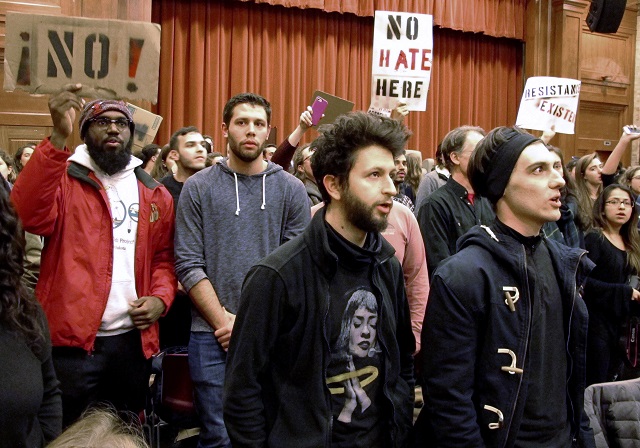
Middlebury College students turn their backs to Charles Murray. Credit: (AP Photo/Lisa Rathke, File)
For the last few years, free speech has been hotly debated on college campuses around the country. There have been protests over controversial speakers. And confrontations around the cultural sensitivity of Halloween costumes. Jonathan Haidt, a social psychologist at NYU and co-author of The Coddling of the American Mind: How Good Intentions and Bad Ideas Are Setting Up a Generation for Failure, sees deeper issues at play. Issues that he thinks are going to impact an entire generation.
Three Takeaways:
- Haidt argues that college students are increasingly fragile and sensitive because they often haven’t been allowed enough free play as children. He says that, because of concerns about crime, kids who grew up after 1990 were frequently not sent outside to negotiate and play with other neighborhood kids, as they might have been in previous generations.
- In his book, Haidt outlines three untruths that he sees as harming young people: the idea that people are fragile, the idea that you should always trust what you feel, and the idea that life is a pitched war between good people and evil people.
- Haidt says that “we have to address both the demands for better inclusion, of racial and other minorities, and the speech and freedom of inquiry issues. We have to address both at the same time.”
More Reading:
- Not everyone shares Haidt’s views about the campus free speech issue. Here’s an article in Vox that says the real problem is left-wing professors being fired for what they believe.
- A piece in The Baffler examines the issue from an economic perspective.
- An op-ed in The Chronicle of Higher Ed says that the view of students protesters as “coddled” is incorrect.
- Here’s some more information about the Yale Halloween incident.
- C-SPAN’s hour-long interview with Allison Stanger, the professor from Middlebury was slated to interview Charles Murray - and ended up with a concussion.

